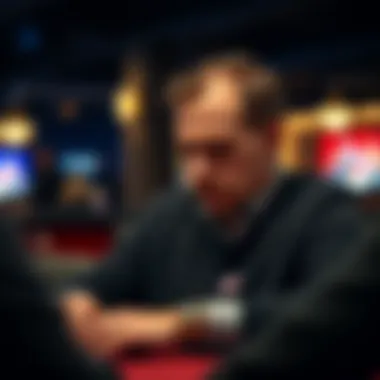Poker Culture and Opportunities in Grand Rapids


Intro
Poker isn't just a game of chance; it's a world of strategy, bluffing, and camaraderie. In Grand Rapids, the scene pulses with unique local flavors and personalized nuances that shape a player's experience. From smoky backroom games in quaint dive bars to bustling tournaments in upscale venues, the poker culture here embraces a diverse crowd of novices and seasoned pros alike. Understanding this environment can greatly enhance a player's journey.
As we delve into the many layers of poker in Grand Rapids, we will walk through the various betting strategies that define the gameplay, dishing out details that can sharpen one’s skills. Additionally, we will cover essential tips and techniques that will assist you, whether an amateur or a savvy veteran, in navigating the vibrant local poker landscape. Ready to shuffle the cards? Let's get started!
Betting Strategies
In poker, each decision made at the table can be analyzed through the lens of betting strategies. Understanding how to manipulate bets can be the difference between winning big and losing your stake.
Types of Betting Strategies
Betting strategies can vary greatly depending on your position at the table and the specific variant of poker being played. Here are some common strategies:
- Aggressive betting: This involves betting heavily or raising often to put pressure on opponents. The goal is to force them to fold or make costly mistakes.
- Conservative betting: A more cautious approach, where a player bets less frequently but more strategically, aiming to maximize the value of their strong hands while minimizing losses.
- Bluffing: Not just a play but an art. Bluffing is about convincing other players that you hold a stronger hand than you do. Timing and positioning are crucial; knowing when and how to bluff can be the backbone of a successful strategy.
- Value betting: This is betting with the intention to extract as much value as possible from strong hands without scaring opponents away.
Each of these strategies comes with its own risks and rewards. Which one suits you best may just depend on your style of play and understanding of the game.
Analyzing Odds and Probabilities
Understanding odds is fundamental in poker. It can help players make informed decisions based on the likelihood of winning a hand. Here’s how it works:
- Pot odds: Compare the current size of the pot to the size of the bet you need to call. For instance, if the pot is $100 and you need to call $25, your pot odds are 4:1, meaning you’ll need to win one out of five times to break even.
- Outs: These are the remaining cards that can improve your hand. Calculating your outs gives you a clearer picture of your chances.
- Expected Value (EV): This calculation involves understanding the potential returns of a bet, which can guide decisions. If the EV of a bet is positive, it’s a good wager; if negative, it’s a call to reconsider.
Poker is a blend of skill and chance, and knowing how to read the odds can elevate your game significantly.
Poker Tips and Techniques
As you sharpen your betting strategies, it�’s equally important to hone essential poker skills to cope with various situations at the table. Here’s a closer look.
Essential Poker Skills
A robust poker player needs to master several key skills:
- Patience: Waiting for the right moment to play your hand can often yield better results than jumping in too soon.
- Reading opponents: Developing an eye for behavioral patterns, betting rhythms, or even facial tells can provide critical insights into your opponents’ minds.
- Adaptability: The ability to read the room and adjust your strategy based on other players’ behavior can dramatically enhance your chances of success.
Understanding Poker Variants
Not all poker games are cut from the same cloth. Familiarity with various variants can diversify your approach and keep the game exciting. The most popular types in Grand Rapids include:
- Texas Hold’em: The most commonly played version, where players receive two private cards, and five community cards are dealt. Players must make the best five-card hand.
- Omaha: Similar to Hold’em but players receive four private cards instead of two, and must use precisely two of them in combination with three from the board.
- Seven Card Stud: In contrast to the previously mentioned games, players do not use community cards but rather are dealt a mix of face-up and face-down cards over several betting rounds.
Familiarizing yourself with the various rules and strategies for these variants can give you an edge—understanding how to adjust tactics according to game types is crucial in enhancing your gaming experience.
"The key to poker isn’t knowing what to play, but rather how to play what you’re dealt."
As we continue to explore the poker landscape in Grand Rapids, keep an eager eye on local events and community vibes that add to the poker experience. The more you engage with the culture, the more you’ll improve your skills and insights.
For more resources on poker strategies and community insights, check these out:
- Wikipedia - Poker
- Britannica - Poker
- Reddit - Poker Community
- Michigan Legal Gambling - State Information
Gear up and shuffle those cards—there's much more to discover!
The Rise of Poker in Grand Rapids
The poker scene in Grand Rapids may not be as famous as Las Vegas, but it has carved out a unique identity that's hard to ignore. This city has witnessed a surprising swell in interest and participation, revealing how poker can unite communities and fuel local economies. Understanding this evolution can offer valuable insights not only for seasoned gamblers but also for those intrigued by the dynamics of gaming in a regional context.
One of the most compelling aspects of poker's rise here is its ability to create spaces for both competition and camaraderie. It's more than just a card game; it's a social hub where people from different walks of life gather with a common purpose. From casual players to serious enthusiasts, the allure of poker fosters relationships and local pride.
Additionally, as poker gains traction, local businesses see the benefits. Many venues hosting games become community staples, contributing to the economy while providing entertainment options. The game serves as a catalyst for social interaction, helping to strengthen the fabric of the local community.
Historical Context
To grasp the current poker landscape in Grand Rapids, we must first look back at its origins. Poker's journey into Michigan took root long ago, but it gathered steam after the state lifted restrictions on gambling in 1997. This pivotal moment sparked a growth spurt that saw casinos popping up across the state, including in the Grand Rapids area. Over the years, poker evolved from being a casual pastime to a cornerstone of local gambling culture.
In tandem with the proliferation of casinos, home games began to flourish. Friends gathered around kitchen tables, built community bonds, and introduced a new wave of players to the game. This grassroots approach laid the groundwork for a vibrant poker culture, essential for nurturing talent and promoting diversity within this gambling sphere.
Current Trends
Fast forward to today, and the poker landscape in Grand Rapids features a variety of trends that reflect both national patterns and unique local flavors. One noticeable trend is the increasing popularity of themed poker nights, which draw crowds looking for an experience beyond the usual gameplay. From charity tournaments to holiday celebrations, these events not only enhance participation but also create a festive atmosphere that attracts newcomers.
Moreover, the rise of technology has transformed the way players engage with the game. Apps and online platforms have become essential tools for many locals. These platforms don't just offer virtual play; they also provide a wealth of resources for strategy improvement and community building. The blend of online and live play means that players can hone their skills anywhere, leading to a more skilled and competitive pool at the tables.
To sum it up, the rise of poker in Grand Rapids reflects a rich tapestry of history, social connection, and adaptation to modern trends. Whether you're an avid player or just starting out, the local poker culture offers something for everyone, blending competitive spirit with a sense of belonging.
Local Venues for Poker
When you think about immersing yourself in the poker landscape of Grand Rapids, local venues serve as the foundation for this thrilling experience. They are not just places to play; they encapsulate the vibrant culture surrounding poker and offer a variety of atmospheres suited to different preferences.
Local casinos and card rooms provide a range of options, each contributing to the poker community in its own unique way. Understanding these venues is crucial for players, whether they are amateurs just getting their feet wet or seasoned veterans looking to hone their skills in a familiar environment.
Casino Options
Overview of Major Casinos
In Grand Rapids, prominent casinos like Gun Lake Casino and Soaring Eagle Casino play a pivotal role in shaping the local poker scene. These establishments offer extensive gaming floors filled with poker tables, making them hotspots for both casual and competitive players. The casinos are characterized by their luxurious settings and the array of poker tournaments they host, which often draw participants from across the region.
The benefit of playing at major casinos is twofold: not only do they have seasoned dealers and well-structured tournaments, but they also come equipped with amenities that enhance the player experience. For instance, many casinos offer food and beverage services, ensuring players can fuel up while they strategize at the table.
In summary, major casinos in Grand Rapids create an environment filled with excitement and competition that is hard to replicate elsewhere.


Unique Features of Each Venue
One thing that sets Gun Lake Casino apart is its frequent poker promotions, including bounty tournaments that can provide players with extra incentives. Meanwhile, Soaring Eagle Casino is known for its lavish poker lounge, where players can enjoy an upscale atmosphere.
Both venues have unique attributes that make them appealing choices for poker enthusiasts. However, it’s important to note that the atmosphere of larger casinos can sometimes feel intimidating for newcomers. While they offer plenty of opportunities for serious players, new entrants might find smaller venues more welcoming and less overwhelming.
Card Rooms and Private Games
Popular Card Rooms
Apart from casinos, Grand Rapids' local card rooms play an essential part in the poker matrix. Establishments like The Poker Room and The Summit provide a welcoming space for different skill levels to join in the game. These venues are often characterized by their intimate settings, where players can converse freely and enjoy a sense of community.
The distinctive feature of these card rooms is their ability to cater to individual preferences. They frequently host tournaments with varying buy-ins, appealing to a broad spectrum of players. For those looking for a more laid-back atmosphere, these card rooms can often provide a more relaxed pace compared to bustling casinos.
Community and Social Aspects
The essence of poker extends beyond just playing cards; it's also about camaraderie and networking. Local card rooms foster a sense of community where players share tips and strategies, creating connections that often extend beyond the game itself.
Some venues even offer mentorship programs, allowing experienced players to guide newcomers. This adds depth to the poker experience, as it helps cultivate a supportive environment for skill development. By participating in these social aspects, players not only improve their game but also build lasting friendships.
To sum it up, the local poker venues, whether it's a major casino or a cozy card room, play an instrumental role in shaping the overall poker experience in Grand Rapids. They cater to diverse player preferences, facilitating both competition and community.
"Every hand is a new opportunity to learn and evolve in the game of poker."
Engaging with these venues ensures that players not only refine their skills but also become part of the vibrant tapestry that is the poker community in this city.
Community and Tournament Scene
The community and tournament scene is the lifeblood of poker in Grand Rapids. While many players indulge in poker as a solitary pursuit, the social dynamics, competition, and camaraderie found at local events contribute significantly to the growth and vibrancy of the poker culture. Engaging in tournaments not only sharpens one’s skills but also provides a platform for fostering relationships, sharing strategies, and even delving into local lore around the game.
The festivals, competitions, and casual leagues connect players from various walks of life, creating an eclectic atmosphere where the thrill of the game meets the warmth of community spirit. Let’s explore this further by examining annual tournaments and grassroots events, split into their respective components.
Annual Poker Events
Signature Tournaments
Signature tournaments represent a pinnacle of excitement in the poker calendar for enthusiasts. These events often offer sizable prize pools and attract the best players in the region. The allure of competing for substantial winnings, alongside the prestige associated with these tournaments, makes them incredibly appealing.
One notable aspect of signature tournaments is their structure, which often varies in format—think Texas Hold'em, Omaha, and even mixed games. This variety ensures that players can not only showcase their existing skills but also experiment with new strategies and gameplay dynamics. Furthermore, such tournaments typically feature professional dealers and a well-organized setting, enhancing the player experience significantly.
However, there are disadvantages. Entry fees may feel steep for newcomers. Participation can also lead to a high-pressure environment, which might not be suitable for all. Nonetheless, the excitement and learning opportunities provided by signature tournaments render them an integral component of the Grand Rapids poker scene.
Notable Organizers and Sponsors
The success of poker tournaments relies heavily on the credible organizers and sponsors behind the scenes. Local poker clubs or organizations often play a pivotal role in organizing these events, ensuring they are conducted fairly and professionally. Noteworthy organizers like the Michigan Poker Tour and local casinos contribute to the scene by structuring the tournaments to maximize player turnout and satisfaction.
A standout characteristic of these organizers is their ability to build a trusting relationship with the player community. Their reputation for fairness and quality attracts more participants, thus contributing to larger prize pools and more elaborate events. On the flip side, not every organizer may provide the same quality, leaving players to determine the best events through reviews or word-of-mouth.
Grassroots Poker Tournaments
Community Engagement
Grassroots tournaments are the unsung heroes in the poker landscape. They are often hosted in local bars, community centers, or private homes and provide a warm, welcoming environment for players of all skill levels. The focus here is not only on competition—it's about connection. Players get the chance to engage with their community, creating bonds that can elevate the collective poker culture.
One of the primary benefits of community engagement in grassroots tournaments is inclusiveness. Newcomers find it easier to participate in a friendly, less intimidating setting compared to large casinos. These gatherings allow players to learn without the high stakes seen in bigger tournaments. The community aspect also fosters a sort of mentorship, where seasoned players share their insights and strategies with novices, enhancing the overall skill level over time.
Player Skill Development
Skill development cannot be understated when discussing grassroots tournaments. Many players view these smaller events as stepping stones to greater achievements in the poker realm. The practice offered here is invaluable, allowing players to refine their tactics and strategies in a low-pressure environment.
Uniquely, grassroots tournaments often promote experimental play. Players can try out unconventional strategies or bluffing techniques without the fear of a considerable financial loss. This dynamic fosters a culture of improvement and learning, which benefits both the individual and the larger poker community.
The drawbacks? Well, sometimes the organization might lean towards being less formal, which could affect the quality of play or rules adherence. Players need to balance enjoyment with skill enhancement while participating in these events. Ultimately, though, grassroots tournaments cultivate not just better players, but also a tighter-knit poker family within Grand Rapids.
Legal Landscape of Poker in Michigan
The legal framework surrounding poker in Michigan is as intricate as a seasoned player's strategy, influencing not just how the game is played but also its acceptance in the wider community. Understanding this landscape is crucial for anyone looking to partake in poker, be it casually or competitively. The rules and regulations serve as the backbone of the poker scene, ensuring fair play while fostering growth and stability in the industry.
Regulations Governing Poker
The regulations that govern poker in Michigan are a mix of state laws and local policies, making it necessary for all players and establishments involved to stay informed.
Licensing Requirements
Licensing is perhaps the most essential part of the poker scene in Michigan. All poker rooms and casinos must adhere to stringent licensing requirements set by the Michigan Gaming Control Board. This ensures that any venue offering poker games operates with a standard of integrity and security.
One key characteristic of these licensing requirements is their comprehensive nature. Establishments must not only pass background checks but also comply with financial regulations. This is a popular point of discussion because it reinforces the legitimacy of poker venues, which is vital for players seeking a safe and regulated environment.
A unique feature of these licensing requirements is their adaptability. They can evolve to accommodate new gaming trends. For example, the rise of online poker platforms has prompted adjustments in regulatory frameworks to address the needs of digital gaming while ensuring safety. However, the downside can sometimes be a bureaucratic delay in adjusting these laws, leaving players in limbo as they wait for updates.
Compliance with State Laws
Compliance with state laws is another cornerstone that shapes the poker landscape in Michigan. Each player must be aware of and abide by these laws to avoid legal complications that could ruin an otherwise enjoyable game.
A critical characteristic of compliance is its emphasis on transparency. Many poker venues voluntarily go above and beyond state requirements to maintain a positive reputation. This approach not only benefits the establishments but also enhances the overall trust within the community of players.
On the flip side, one unique aspect of compliance involves the need for continual education. Players and operators must stay abreast of changes in state legislation, which can sometimes shift unexpectedly. Thus, failure to remain compliant can lead to substantial penalties, affecting not just individual players but the entire poker community.
For poker enthusiasts in Grand Rapids, understanding the legalities surrounding their favorite game is not just advisable; it's essential.
Impact of Recent Legislation


Recent legislation, particularly the expansion of online gambling laws in Michigan, has reshaped the poker landscape dramatically. This means that more players can engage in games from the comfort of their homes. The new laws have also ushered in a wave of revenue for the state, with taxes from gambling helping to fund various public services.
However, legislative changes bring their own set of challenges. One potential obstacle is ensuring that online platforms abide by the same rigorous standards expected of traditional brick-and-mortar casinos. As the market grows, so too does the risk of unlicensed operators looking to cash in on the evolving poker environment.
As poker in Grand Rapids and, by extension, Michigan continues to flourish, staying informed about these legal intricacies is not just beneficial but vital for maintaining a healthy poker ecosystem. Whether you're a casual player or a seasoned professional, understanding the regulatory landscape can provide you with a clearer view of the game both on and off the table.
Strategies for Success at the Table
Successful poker playing is like playing a well-choreographed dance; it requires not only skill but also an understanding of one's self and the environment. By honing one's strategies at the table, players can significantly improve their chances of coming out ahead. This section delves into the fundamental strategies and advanced techniques that every poker player, regardless of skill level, should incorporate into their game. Mastery over these strategies can lead to a more fulfilling gaming experience and perhaps even a boost in that bank account.
Fundamental Strategies
Understanding Odds and Probabilities
Understanding odds and probabilities is at the heart of poker strategy. Simply put, it helps a poker player make informed decisions about betting, calling or folding. This concept involves calculating the chance of getting a winning hand compared to the risk involved in the bets made. For example, when holding a flush draw, if there are nine outs left to complete the flush, the player has about a 35% chance of hitting the necessary card on the next turn. This clarity can really shape how aggressive or conservative a player should be in a particular hand.
Many players find this aspect beneficial because it introduces a systematic approach to decisions made at the table. Players who can quickly analyze the odds often maneuver their way into more favorable situations than others who rely on instinct or luck alone.
One downside to keep in mind is that while odds can guide decisions, they can’t account for every variable, especially when it comes to psychological tactics and reading opponents. Yet, with practice, understanding odds can certainly lay a solid foundation for strategic play.
Reading Opponents
Reading opponents is a blend of art and science. It involves analyzing the tendencies, body language, and betting patterns of fellow players to glean information about the strength of their hands. A keen eye can spot whether an opponent is nervous or confident, which often indicates the power of their hand. For instance, if a player is suddenly quiet and cautious after displaying confidence earlier, they may have a weaker hand than they had previously represented.
The key characteristic of reading opponents lies in its intuitive nature. Successful players develop this skill over time, learning to link behavior with potential strategies. The popular appeal of this technique is rooted in the thrill of outsmarting opponents; there’s a certain rush that comes from making calculated guesses based on human behavior.
However, this is not without its challenges. Misreading a player's intentions can lead to costly mistakes. Therefore, it's essential to balance this skill with a solid grasp of fundamental gameplay dynamics.
Advanced Techniques
Bluffing and Psychological Play
Bluffing is an advanced psychological art in poker that combines a certain level of risk-taking with an understanding of social cues. The essence of a successful bluff lies in telling a compelling story through betting patterns. By presenting oneself as holding a strong hand, a player can coax others into folding, even if their own hand is weak.
What makes bluffing a popular choice in poker is its potential for high rewards at low costs. A well-timed bluff can turn the tide of a game, especially against cautious opponents who might not want to risk their chips unnecessarily.
However, bluffing requires a profound understanding of your opponents' tendencies and the context of the table. It can backfire spectacularly if opponents call your bluff, leading to significant financial losses. This makes it crucial for players to gauge when it's worth taking the risk.
Managing A Bankroll Effectively
Managing a bankroll effectively is one of the cornerstones of longer-term success in poker. This involves setting limits on how much one is willing to lose and ensuring that funds are allocated wisely across different games. Strategic bankroll management protects players from the temptations of chasing losses and helps maintain a healthy relationship with the game.
One key takeaway here is the importance of discipline; adhering to set limits, regardless of emotional swings during play, ensures sustainability in the game. A well-managed bankroll allows a player to ride out the downswings and enjoy swings of good fortune without the risk of going bust.
A downside is that strict bankroll management can sometimes limit a player’s potential for profits in high-stakes games, but the long-term advantages often outweigh these short-term sacrifices.
In summary, understanding odds and probabilities, reading opponents, mastering bluffing techniques, and effectively managing a bankroll constitute a well-rounded strategy set that any poker enthusiast in Grand Rapids can leverage to enhance their gaming experience.
The Role of Technology in Poker
Technology has woven itself into the fabric of poker, transforming how the game is played and experienced. In the context of Grand Rapids, understanding this intersection is crucial for both local players and newcomers to the poker scene. The digitization of poker environments, from online platforms to tracking tools, not only enhances gameplay but also changes the social dynamics often associated with the game. With that in mind, let’s dive into some of the key areas where technology is shaping the poker landscape.
Online Poker Platforms
Online vs. Live Play
When it comes to playing poker, the debate between online and live formats is a hot topic among enthusiasts. Online play offers unprecedented convenience, allowing players to jump into games from the comfort of their homes. You don’t need to dress up or travel anywhere; you can just log in and start playing. This aspect is especially appealing to those who may be juggling job commitments or have other responsibilities.
However, live play brings its own unique flavor into the mix. The ambience of a casino, the sound of chips being shuffled, and the psychological elements of reading opponents face-to-face can't be replicated online. This social interaction tends to deepen the sense of community among players. Thus, deciding between online and live games might come down to personal preference. Each has its own benefits and drawbacks, making both appealing for different reasons.
"The essence of poker lies not just in the cards, but in the people you play with."
Popular Online Platforms Among Local Players
In Grand Rapids, several online platforms have gained traction among local players. Websites like PokerStars and 888poker stand out due to their user-friendly interfaces and extensive game selection. These platforms allow for numerous tables and tournament options, catering to a wide range of skill levels. Moreover, they often offer promotions and bonuses, which provide added value for players looking to stretch their bankrolls.
A key characteristic of these platforms is their robust security measures. Many players appreciate the peace of mind that comes from knowing their personal and financial data is well protected. However, it's important to remember that playing online may lack some of the same thrills as sitting at a physical table, especially for those who yearn for that social element.
Tracking Software and Tools
Overview of Available Tools
As poker evolves, so does the technology that helps players improve their game. Various tracking software tools, such as Holdem Manager and PokerTracker, have become essential resources. These tools allow players to analyze their gameplay, track their statistics, and find areas needing improvement. They quantify data that would otherwise remain anecdotal, greatly contributing to a player's understanding of their strengths and weaknesses.
The key characteristic of these tools is their ability to present data in accessible formats—graphs, charts, and reports—making it easier for players to digest complex information. However, players should keep in mind that various sites may have different policies on using such software, so it’s vital to stay informed.
How Technology Enhances Player Performance
Tracking technology scales another layer around performance enhancement. It gives players insights into their betting patterns and tendencies of opponents, which is a significant advantage at high-stakes tables. Using this data, players can cultivate strategies tailored specifically to their unique gameplay styles or adjust approaches according to their opponents' habits. Furthermore, familiarizing oneself with statistical nuances can reduce emotional biases when making decisions under pressure.
While these tools vastly improve understanding of the game, they come with their own challenges. Relying too heavily on statistics could strip some of the spontaneity and intuition from play, potentially leading to a more mechanical approach to the game. Navigating this balance is essential for any poker player seeking to maximize their potential while staying true to what makes the game enjoyable.
Building a Poker Community
Creating a vibrant poker community in Grand Rapids goes beyond just the game itself. It involves cultivating a network of like-minded individuals who share a passion for poker, promoting camaraderie, and providing support for players at all skill levels. A strong community not only enriches the poker experience but also fosters personal growth, skill improvement, and a deeper appreciation of the game.
Local Poker Clubs and Organizations
Membership Benefits
Becoming a member of a local poker club is a gateway to multiple advantages for players. One of the key features of membership is the access to exclusive tournaments and events not open to the public. This provides players with a chance to compete against others who share their enthusiasm and skill level, creating a more engaging and stimulating environment.


Furthermore, clubs often provide resources such as study materials and strategy discussions, which can significantly enhance a player's understanding of the game. With various leagues available, members also benefit from the flexibility to choose tournaments that fit their schedules and styles, from casual games to more competitive environments.
However, not all memberships are created equal. While some clubs may charge nominal fees, others might have steep dues, which can be a barrier for potential members.
Networking Opportunities
Networking within the poker community is essential for growth and success. Local poker clubs and tournaments serve as a fertile ground for building relationships. Players can meet seasoned veterans willing to share their insights and novices eager to learn. This interaction can lead to collaborative practices, where individuals learn from each other's experiences.
The social aspect of networking can't be overlooked either. Friends made at the table often extend to friendships off it, creating a supportive environment that is hard to replicate in isolation. Attending local events allows players to exchange advice and strategies, and even share resources like training materials.
Bear in mind that some players might feel intimidated in networking situations, particularly in large clubs. It's important for organizations to create welcoming environments where everyone feels comfortable to share and interact.
Engaging with New Players
Mentorship Programs
Mentorship programs play a crucial role in developing new players. They often connect inexperienced players with seasoned mentors who can offer personalized guidance and support. A key characteristic of these programs is their structured approach, which typically includes one-on-one sessions focusing on aspects like gameplay, strategy, and psychological elements of poker.
This is a beneficial choice within the community as it accelerates the learning curve for newcomers. Mentorship fosters confidence, builds a sense of belonging, and often leads to lasting friendships. One of the unique features of mentorship programs is their adaptability; mentors can tailor their teaching styles to fit the needs of the mentees, ensuring a deeper understanding of the game.
However, as with any mentorship, finding the right match between mentor and mentee can be challenging. Not every personality blends well, and some new players might feel uncomfortable seeking help.
Workshops for Skill Development
Workshops designed to bolster skill development are vital in keeping the poker community vibrant and competitive. They often dive into various strategic elements such as betting patterns, hand reading, and game theory. A key characteristic of these workshops is their hands-on approach, where participants actively engage with practical scenarios that reflect real-game situations.
These workshops are popular for several reasons—they provide a structured learning environment and access to experienced instructors who can impart valuable knowledge. Participants benefit from live feedback during sessions, which can significantly improve their game. A unique feature of these workshops is their adaptive curriculum, which can change based on the participants' skill levels.
Nevertheless, the effectiveness of a workshop can sometimes be hindered by varying levels of participant engagement. If some attendees are not actively involved, the learning experience can suffer. Maintaining an encouraging atmosphere is key to the success of these skill sessions.
Cultural Impact of Poker
The realm of poker transcends mere gambling; it embodies a unique cultural phenomenon in Grand Rapids. As a city that possesses a rich tapestry of history and a dynamic community, the impact of poker on local culture is significant. Poker serves not only as a form of entertainment but also as a catalyst for bringing people together. By weaving poker into the fabric of social gatherings and events, the game cultivates a sense of belonging among players and spectators alike.
Poker as Entertainment
Media Representation of Poker
The portrayal of poker in media has added a layer of intrigue and fascination. Films like "Rounders" or shows like "Poker After Dark" have contributed to shaping a narrative around poker that extends beyond the card table. This representation typically highlights the psychological warfare and strategy involved in the game. In Grand Rapids, this aspect of poker draws in individuals who seek not just skill but a pulse-pounding thrill.
Key Characteristic: The drama and complexity of poker as a mind game. It appeals to the strategic thinker and the casual observer.
By showcasing high-stakes games and skilled players, media representation enhances poker's attraction in the community. People are more interested when they see poker portrayed as a cerebral conflict rather than a mere game of chance. This depiction serves as a beneficial feature, establishing a sophisticated image around poker that encourages participation.
Unique Features: The blend of personal stories and competitive rivalry creates a narrative that's compelling and engaging. However, there can be downsides, such as glamorizing risk-taking behavior, which may not be suitable for all audiences.
Integration into Local Events
Poker's role in local events further highlights its cultural significance. Tournaments and friendly games can often be found in charity fundraisers and community gatherings. These events support local causes while fostering a strong sense of camaraderie.
Key Characteristic: Poker operates as a social glue that adheres the community together.
The integration of poker into such events makes it a popular choice, encouraging community members to mingle and create connections. Often, the atmosphere at these gatherings fosters new friendships and strengthens existing ones.
Unique Feature: The festive vibe that poker brings to local festivities can invigorate events, transforming the atmosphere into one ripe with excitement. On the flip side, the casual appearance of some gatherings may lead to misunderstandings about the nature of poker and responsible gaming.
Contributions to Local Economy
Employment Opportunities
Employment opportunities in the poker sector impact not only dealers and casino staff but also a wider net of related professions. The demand for skilled workers makes the poker scene a boon for job seekers in Grand Rapids.
Key Characteristic: Diverse career paths ranging from hospitality to event organization arise due to poker's popularity.
This is a beneficial aspect for the local economy; creating jobs helps sustain a stable economic environment. Furthermore, dealers and managers often build lasting relationships with regular players, fostering loyalty and repeat business.
Unique Feature: The jobs created are not just limited to casinos but spill over into surrounding businesses, stimulating growth in areas like catering, event planning, and security. The downside, however, is the risk of economic fluctuations that can affect job stability.
Tourism Related to Poker Events
Local poker events and tournaments also attract tourists, positioning Grand Rapids as a destination for poker enthusiasts. Visitors drawn in by major tournaments or unique poker festivals help to bolster the local economy.
Key Characteristic: The surge in tourist activities around poker events underscores Grand Rapids as a vibrant hub for gaming.
This aspect is a popular choice in attracting both regional and national visitors, contributing to increased revenue for local businesses.
Unique Feature: The tourism generated by poker can have long-lasting benefits for the city’s image; however, reliance on gambling tourism can be unpredictable, as it is sensitive to broader economic conditions.
Overall, the cultural impact of poker in Grand Rapids signifies a fusion of entertainment, economic development, and community bonding that enriches the city’s social landscape. Understanding its nuances is essential for all stakeholders involved.
Future of Poker in Grand Rapids
The future of poker in Grand Rapids is not just a matter of speculation; it’s an integral part of the narrative that connects players, venues, and the broader community. As the poker scene evolves, understanding its prospective trajectory allows enthusiasts and industry stakeholders to prepare and adapt. This section delves into what's on the horizon for poker in this vibrant Michigan city, including emerging trends, shifting cultural attitudes, and potential hurdles.
Predictions and Trends
In looking ahead, several key trends appear to be shaping the future of poker in Grand Rapids:
- Increased Popularity of Online Play: The pandemic ushered in a wave of online poker, and even as life returns to normal, many players have grown fond of the convenience it offers. Local players are likely to continue balancing their engagement between online platforms and brick-and-mortar venues, leading to a hybrid poker culture.
- Youth Engagement: Younger generations are taking to poker, intrigued not only by the competitive aspects but also by the social dimensions. Poker leagues designed for millenials and Gen Z are popping up, creating an ecosystem that nurtures new talent and friendships. Community events aimed at this demographic might soon become more prevalent, fostering a culture of inclusivity.
- Technological Advancements in Gaming: The integration of technology into poker gameplay is expected to grow. Tools such as real-time tracking software and advanced game simulations could become more commonplace, allowing players to hone their skills more effectively. These innovations may also attract a new crowd of gamers who appreciate data-driven games.
- Sustainability Initiatives: As awareness of environmental issues rises, gambling venues are exploring sustainable practices. Casinos may implement greener operations, from energy-efficient lighting to waste reduction efforts. These sustainability initiatives could resonate well with the community, enhancing the venues’ reputations and providing a sense of shared responsibility.
"The evolution of poker in Grand Rapids is more than just about winning hands; it’s about building connections that enhance the communal experience."
Potential Challenges
Despite a bright outlook, there are challenges looming on the horizon for poker in Grand Rapids:
- Regulatory Hurdles: As the poker scene expands, so too might scrutiny from regulatory bodies. Given Michigan's strict gaming laws, any changes or expansions in poker offerings must navigate these complexities. Overregulation could stifle innovation and deter new players or venues from entering the market.
- Market Saturation: With new online platforms and local venues vying for attention, there’s a real risk of market saturation. If not managed properly, this could lead to stiff competition that undermines profitability for existing establishments. Maintaining a balance of supply and demand will be crucial.
- Changing Demographics: While engaging young players is beneficial, it’s important not to alienate the traditional poker crowd. Communities can face identity crises when attempting to accommodate new players without losing the essence that initially attracted long-time enthusiasts.
- Health Concerns: Ongoing health issues related to in-person gatherings can deter participation in any capacity. Ensuring safe environments for players might require enhanced protocols or limited capacity, directly affecting venue operations and tournament sizes.







